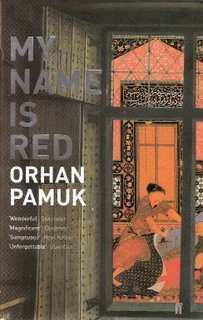 Review: My Name is Red, Orhan Pamuk (2001)
Review: My Name is Red, Orhan Pamuk (2001)In this savagely brilliant novel Pamuk has reached a level of conspicuous artistry that few attain. With the plotting of a master of crime fiction, the intensity of a philosophical treatise, the empathy of a great nineteenth-century novelist and the knowingness and humour of the ascendant tradition of postmodern fiction, he has covered all bases and struck the ball way over the boundary.
Often reading like a fable and focalised through different characters — men and women, children, high and low even, at one point, through the consciousness of a debased gold coin — the novel draws us into a dense tangle of conflicting desires and shared destiny. The city of Istanbul rises, gloomy and heavily trod, above the minutiae of the events that are recounted with enormous gusto and verve. It lives and breathes like another character, riding on the boundary between East and West, and subject to forces that alternately draw together and force apart the two hemispheres of the early-modern historical world.
At the end of the book is a chronology, where we learn that the events that take place take place in the year 1591. The Renaissance is in full swing, Shakespeare is entering into his prime, and Turkey hesitates on the sill of a great cultural transformation that will rend the West now, and leave the East in peace for a few hundred years more, until it, too, is challenged by modernity.
Concepts such as 'style' are seen by Pamuk to embody this transformation, as cultural practitioners in the West begin to bring the individual into a central position in the universe. In the following passage the first voice is that of the miniaturist known as 'Olive':
"But I have no style whatsoever," I said. "I'm not saying this out of pride to counter the latest tastes. Neither am I saying so to prove my innocence. For me, having a style would be worse than being a murderer."
"You have a distinct quality that distinguishes you from the old masters and the others," said Black.
Having lived as a clerk with the entourage of a nobleman, touring the Far East for twelve years, Black has returned to Istanbul to find that the woman he once wished to marry, Shekure, has lost her husband. His hopes revive. But he has enemies, particularly Hasan, the brother of the cavalryman who has not returned from the front. Meanwhile a miniaturist named Elegant has been killed. The identity of the murderer and the anger of Hasan, as well as the ruthlessness of the government that has become involved in the drama because of the personal interest of the Sultan in a particular book that Shekure's father was having made, combine to create a tense atmosphere, with a constant sense of something about to happen. This tension remains throughout the book, hovering in the background while the characters tell their individual stories and render a faithful picture of the city, its sectarian violence, its rupturings and wounds.
Iconoclasts are abroad also. For the miniaturists, these men are the common enemy, and a powerful one. This theme is intensely topical in the light of the recent attacks on Danish properties in Middle Eastern cities following the publication in a Danish magazine of cartoons lampooning Mohammad. In fact, the entire book rests in the realm of 'engaged' fiction.
A brilliant book. Totally worth reading.
Thanks for this review. I definitely want to read more by Pamuk. I read Snow earlier this year, a deeply thought-provoking book that made me see the world in a slightly different way. And, for someone as jaded as me, that is really saying something!
ReplyDeleteThis comment has been removed by a blog administrator.
ReplyDelete